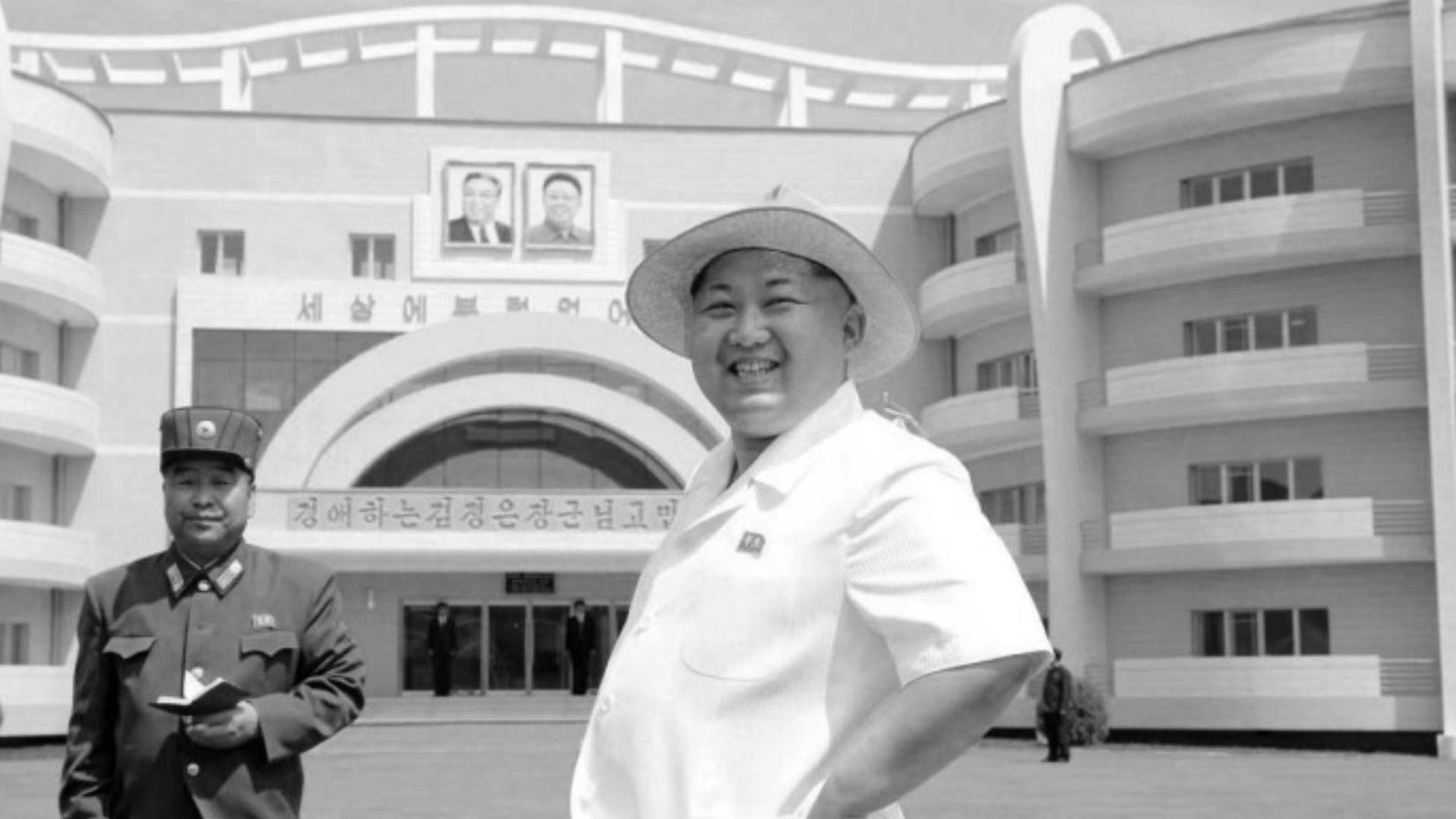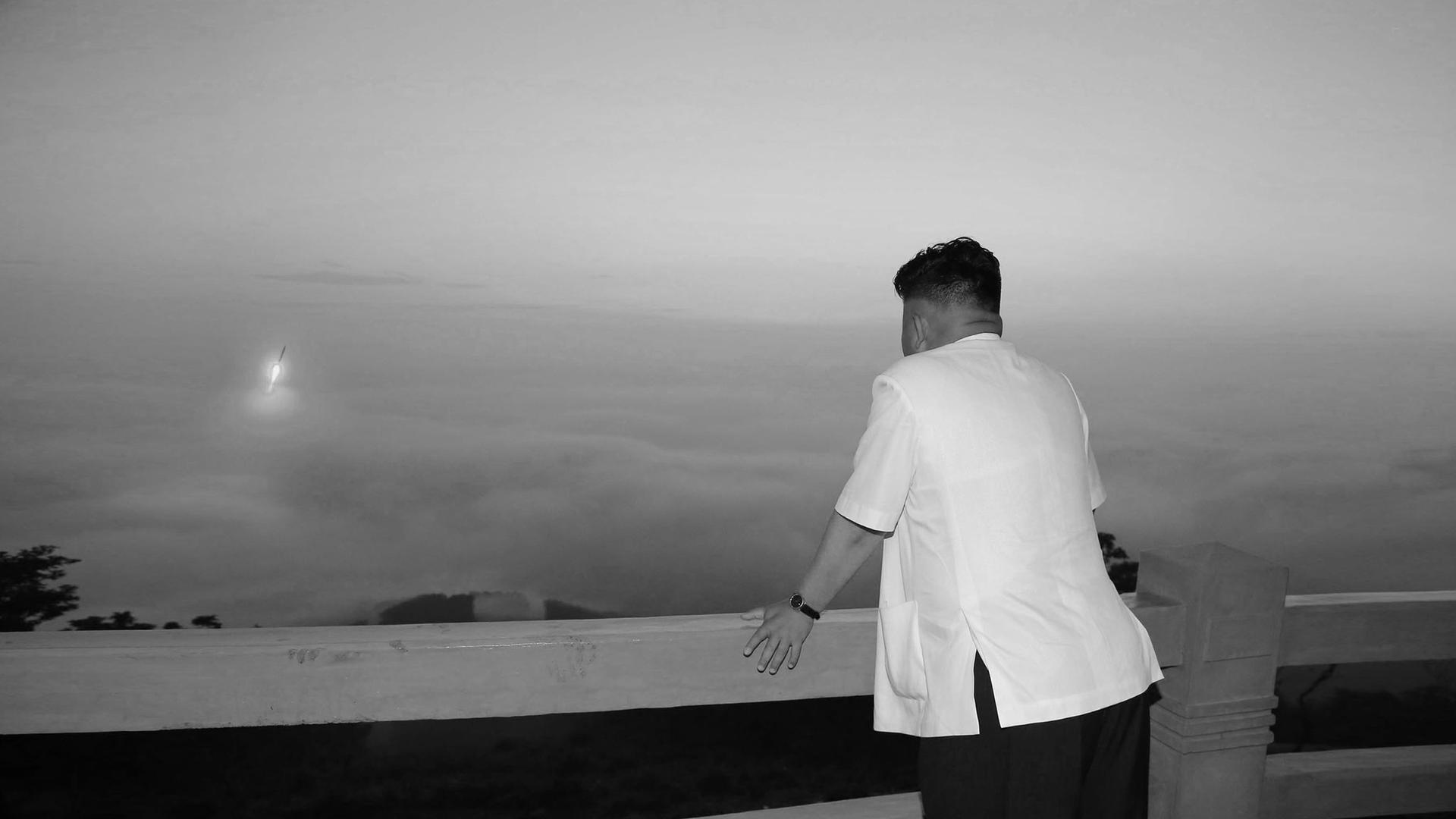DESPITE all his hefty rhetoric, North Korea’s missile tests may reveal more about how Kim Jong-un holds on to power than his attitude to foreign powers.
These are the despotic tools of Kim Jong-un. But they may now have unintentionally sparked the ‘fire and fury’ international backlash over his nuclear missile program.
It’s because Kim Jong-un has met his equal in Donald Trump.
“This kind of highly personalised, ad hoc diplomacy may be exciting and play well for a domestic audience keen to see their leader as someone to be reckoned with,” says Dr Genevieve Hohnen, Lecturer in Politics and International Relations, Edith Cowan University. “But it is inevitably destabilising and counter-productive to actually solving critical issues, such as the North Korean nuclear crisis.”
At the heart of the crisis is a clash of personality cults.
And understanding this is the diplomatic minefield that must be navigated to disarm a diplomatic crisis from going nuclear.
“Most of Jong-un’s nuclear rhetoric is about domestic policy,” Dr Hohnen says. “He doesn’t want to provoke a response from the West. It’s more about internal loyalty than it is the external environment.”
That loyalty is a problem.
And so is balancing that internal powerplay against the rest of the world.

MIND GAMES
Things got so desperate for North Korea during a severe famine in the 1990s that the population resorted to tearing up critical infrastructure for copper wire. This was sold on the black market in exchange for food.
The capital of Pyongyang at times still only has power for three or four hours out of every day as a result, and less than a third of the country’s factories are running due to power shortages.
So why haven’t the people of North Korea attempted to overthrow its despotic government? Surely they have it so bad, they’d feel compelled to rise up?
But they haven’t. Yet.
“I think we assume that the people of North Korea think like we do, that they know they are being brainwashed. But they don’t, ” Dr Hohnen says.
“What we don’t understand is that this is the sixth generation of a people who have never had access to information beyond what they’ve been told by their government.”
“This is their reality. The reasons for their troubles — such as famine — are explained very differently inside North Korea. They blame the West. It’s all because of the imperialist enemy’s behaviour.”

PLAYING WITH FIRE
Dr Hohnen says she believes the recent international flare-ups to be an unintended consequence of Kim Jong-un’s efforts to shore up his power base at home.
“Nothing North Korea is saying is new or different to what they’ve said in the past,” she says. What is different is the West now believes Kim Jong-un has the capability to follow through with his inflammatory threats.
“I don’t think he counted on the sort of response he got from Trump. He probably just expected more sanctions,” she says.
“The possibility of actually engaging in a military conflict is something they’re not actually keen on or anticipated. That said, they will not shy away from a military response if provoked.”
But North Korea’s quest for intercontinental nuclear weapons and the Kim dynasty’s struggles to remain in power are intimately connected, Dr Hohner says.
“He’s controlled his family relatively effectively. The biggest risk factor now is with his generals. The Kims actually use the nuclear program to justify the enormous GDP spend to reward the generals and military for their continued loyalty.”
The problem now is that nuclear capacity has suddenly become very real outside his own borders.
So Jong-un faces a delicate balance between maintaining the support of his generals, while hosing-down fears abroad.
This is why any demand North Korea dismantles its nuclear program will fall on deaf ears, Dr Hohnen says.
“It’s so pivotal to his internal power structure, he cannot afford to lose it. Demanding a pause to the program should be enough to get everyone to the table.”
And understanding the Kim’s grip on North Korea will be necessary for anyone attempting to defuse the international crisis.

KNOW YOUR PLACE
North Korea has a political caste system, called Songbun.
The Kim dynasty has artfully played how these three layers of society interact through controlling information and manipulating deeply entrenched cultural characteristics.
At the bottom of the caste system are the Hostiles: Anyone who has expressed dissent with the government is assigned here. As are their children. Anyone with a family history of crime is also bundled into this group — along with the descendants of pre-civil war Korean landowners. And then there is the subgroup called Complex — where anyone considered undesirable is bundled, even if they’re not considered a threat.
A kind of middle class is categorised as Wavering: Making up about half North Korea’s population, this group is made up of those whose loyalty the government has not determined. But they do have a chance to prove their loyalty — and be rewarded by being promoted to the Core.
At the pinnacle of power is the Core caste. Built around the Kim family itself, only those judged to belong to politically loyal families are allowed to join the Korean Workers’ Party — and to hold key positions in the military and government.
This is where the mastery of the Kim family’s social manipulation comes in.
“You don’t know what class you’re in,” Dr Hohen says. “It’s a hidden document detailing each person’s status. Even those in the Core don’t know where they belong, so they are constantly motivated to try to reassert their devotion to the regime.”
“Even when I’ve interviewed dissidents and defectors, they generally don’t express concern about the central government. They say it is corruption in the layers below that is the problem.
“Kim Jong-un’s personality cult is so strong that even defectors often don’t blame him personally.”

SINS OF THE FATHER
Intimidation is one of any despot’s greatest tools.
The Kim family is certainly using it to project an impression of international strength.
But, internally, the threat of retribution goes far beyond the individual.
Crimes against the state can result in a whole family being punished over the course of three whole generations.
And such a crime could be as simple as possessing the wrong DVD. Information is an asset closely controlled and regulated by the state.
“The North Korean state justifies this punishment by saying your children carrying the stain of your sins,” Dr Hohnen says.
“This makes disaffected people much less likely to defect or speak out — because of what will happen to their family.”
And it’s the central place family has in North Korean society that helps embed the Kim’s place in perpetual government.
Dr Hohnen says North Korea has had no immigration in the past 60 years. So it is one of the most ethnically homogenous populations in the world.
And this reinforces the importance Korea places on racial purity.
“They see themselves as a pure race, a morally superior Korean race,” Dr Hohen says. “It forms a core part of all their ideologies and systems, they use this idea of racial purity as a way to further embed the regime.”
Dr Hohnen says there is plenty of evidence the policy of punishment extending down the generations is being regularly applied — even if not consistently.
And that in itself may be purposeful.
Uncertainty, and the anxiety it generates, is one of the Kim family’s most exploited social manipulation tools.

CLIMBING OLYMPUS
At the top of this delicate balance of social carrots and sticks is the Kim family.
It’s there because of the personality cult they have woven into North Korean society.
“In every house in North Korea one wall must have official portraits of the three leaders and be free for all other adornment,” Dr Hohen says. “The images of the leaders as gods is something that is consistent throughout the hermit kingdom. The North Koreans actually borrow repeatedly from Christian imagery in their creation of the cult of personality around the Kim family.”
But it’s not a good time to be a Kim.
“Jong-un is probably the weakest of all the Kims given the way he came to power,” Dr Hohen says, “But they’re not going to be able to replace him unless it’s with another Kim.”
Unsubstantiated rumours that China was considering grooming his half-brother, Jong-nam, as just such a replacement may have led to his assassination by poison in a Malaysian airport earlier this year.
It’s nothing new.
Jong-un has been ruthlessly killing off potential threats since he took control of North Korea following his father’s death in 2011.
He executed his uncle General Jang Song-thaek in 2013 on charges of corruption. When Jong-un’s aunt Kim Kyong-hui publicly protested she was poisoned.
The remainder of that family — all Jong-un’s cousins — have since been shot dead.
Jong-un does have an older brother.
“We’ve not heard much about Jong-chul,” Dr Hohner says. “There were suggestions he wasn’t manly enough, and too feminine in disposition to be leader. There were also suggestions Jong-un looked much more like his idolised grandfather — and that’s why he was chosen as leader.”
His sister has no public profile. And the chances of any woman rising to a position of power are very slim.
But the struggle to stay king of the hill is an all-consuming obsession for Jong-un.
And it’s one which overrules considerations of international fallout.



Add your comment to this story
To join the conversation, please log in. Don't have an account? Register
Join the conversation, you are commenting as Logout
Mangione pumps fist, wild police findings
Bullets wrapped in “wet” underwear were found in Luigi Mangione’s backpack, and handwritten notes were found on the accused assassin, a court has heard.
15yo’s rape vid so horrific it could cause riots
This is the chilling moment two teenage migrants “forcefully” walk the 15-year-old girl they rape through a dark park.